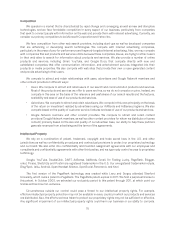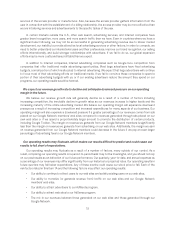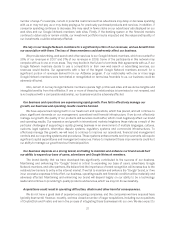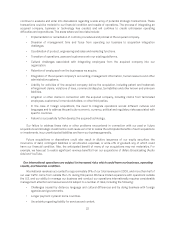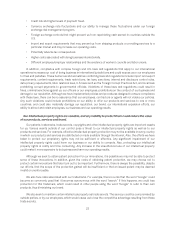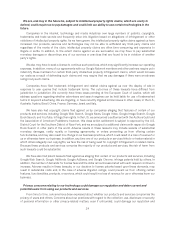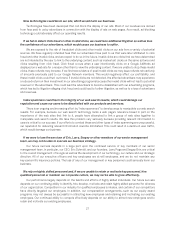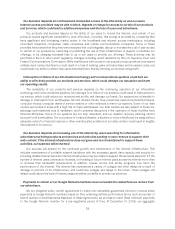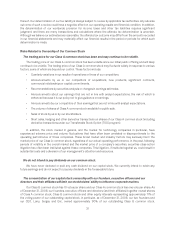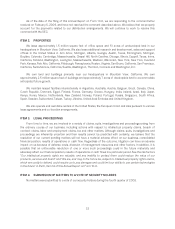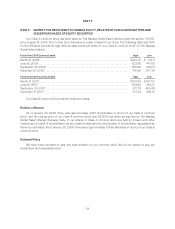Google 2008 Annual Report Download - page 41
Download and view the complete annual report
Please find page 41 of the 2008 Google annual report below. You can navigate through the pages in the report by either clicking on the pages listed below, or by using the keyword search tool below to find specific information within the annual report.operating results. While we strive to comply with all applicable data protection laws and regulations, as well as our
own posted privacy policies, any failure or perceived failure to comply may result in proceedings or actions against
us by government entities or others, which could potentially have an adverse effect on our business.
In addition, as nearly all of our products and services are web based, the amount of data we store for our users
on our servers (including personal information) has been increasing. Any systems failure or compromise of our
security that results in the release of our users’ data could seriously limit the adoption of our products and services
as well as harm our reputation and brand and, therefore, our business. We may also need to expend significant
resources to protect against security breaches. The risk that these types of events could seriously harm our
business is likely to increase as we expand the number of web based products and services we offer as well as
increase the number of countries where we operate.
Regulatory authorities around the world are considering a number of legislative proposals concerning data
protection. In addition, the interpretation and application of data protection laws in Europe and elsewhere are still
uncertain and in flux. It is possible that these laws may be interpreted and applied in a manner that is inconsistent
with our data practices. If so, in addition to the possibility of fines, this could result in an order requiring that we
change our data practices, which could have an adverse effect on our business. Complying with these various laws
could cause us to incur substantial costs or require us to change our business practices in a manner adverse to our
business.
A variety of new and existing U.S. and foreign laws could subject us to claims or otherwise harm our
business.
We are subject to a variety of laws in the U.S. and abroad that are costly to comply with, can result in negative
publicity and diversion of management time and effort, and can subject us to claims or other remedies. Many of
these laws were adopted prior to the advent of the internet and related technologies and, as a result, do not
contemplate or address the unique issues of the internet and related technologies. The laws that do reference the
internet are being interpreted by the courts, but their applicability and scope remain uncertain. For example, the
laws relating to the liability of providers of online services are currently unsettled both within the U.S. and abroad.
Claims have been threatened and filed under both U.S. and foreign law for defamation, libel, slander, invasion of
privacy and other tort claims, unlawful activity, copyright and trademark infringement, or other theories based on
the nature and content of the materials searched and the ads posted by our users, our products and services, or
content generated by our users.
In addition, the Digital Millennium Copyright Act has provisions that limit, but do not necessarily eliminate, our
liability for listing or linking to third-party web sites that include materials that infringe copyrights or other rights, so
long as we comply with the statutory requirements of this act. The Child Online Protection Act and the Children’s
Online Privacy Protection Act restrict the distribution of materials considered harmful to children and impose
additional restrictions on the ability of online services to collect information from minors. In the area of data
protection, many states have passed laws requiring notification to users when there is a security breach for
personal data, such as California’s Information Practices Act. We face similar risks and costs as our products and
services are offered in international markets and may be subject to additional regulations.
We are subject to increased regulatory scrutiny that may negatively impact our business.
The growth of our company and our expansion into a variety of new fields implicate a variety of new
regulatory issues and may subject us to increased regulatory scrutiny, particularly in the U.S. and Europe.
Moreover, our competitors have employed and will likely continue to employ significant resources to shape the
legal and regulatory regimes in countries where we have significant operations. Legislators and regulators may
make legal and regulatory changes, or interpret and apply existing laws, in ways that make our products and
services less useful to our users, require us to incur substantial costs, or change our business practices. These
changes or increased costs could negatively impact our business.
25


